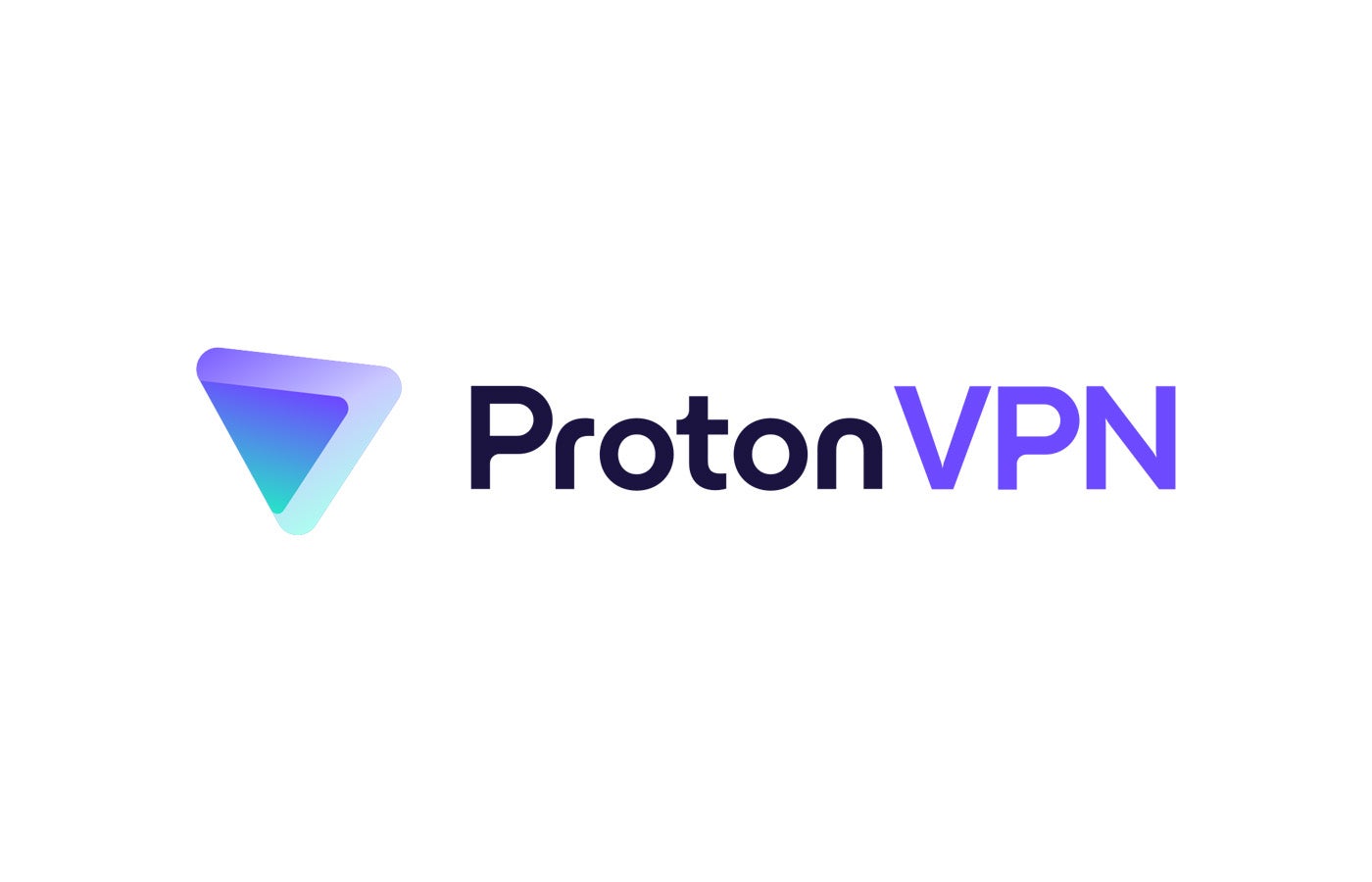ProtonVPN Fast facts |
|---|
| Our rating: 4.0 stars out of of 5 Pricing: Starts at $5.99 per month Key features
|
Proton VPN is an open-source VPN with a good balance of security and affordability. Its highlight feature is its Swiss-based privacy. Based in Switzerland, Proton complies with Switzerland’s strong privacy laws — a plus for businesses and individuals concerned about government data requests.
Proton also offers a free version of the VPN, giving users access to servers in three countries (the U.S., the Netherlands and Japan). While it isn’t the fastest VPN on the market, Proton’s healthy server network and solid encryption protocols make it a good all-around option.
ProtonVPN Pricing
| Proton VPN Free | Proton VPN Plus | Proton VPN Unlimited | |
|---|---|---|---|
| 1 year | Free | $5.99 per month | $9.99 per month |
| 2 years | Free | $4.99 per month | $7.99 per month |
| 1 month | Free | $8.99 | $12.99 |
| VPN speed | Medium | Fastest | Fastest |
| Main Features |
|
|
|
ProtonVPN Free Version
Figure A
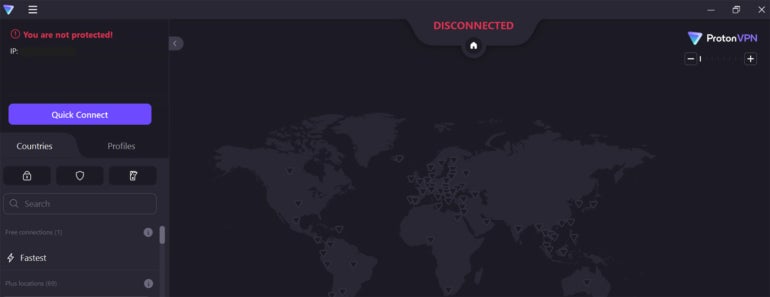
Proton offers free access to 86 servers from the USA, Netherlands and Japan. With the free version, you get medium VPN speed, a kill switch and unlimited data. Windows and Android users also get access to Proton’s split tunneling feature for free.
The free version is best for users who are unsure about spending on a full VPN service or those who only need one VPN connection and basic functionality.
If you plan on connecting multiple devices or need the fastest connection, Proton VPN Plus is best. It allows users to connect 10 devices simultaneously, has Proton’s fastest speeds at the lowest possible cost and includes Proton’s full server suite. Those who also use VPNs for torrenting (P2P) and streaming should opt for the VPN Plus plan, as this is not available on the free version.
Lastly, I recommend Proton Unlimited only for users who want Proton’s other encryption-based services on top of the features you get with VPN Plus.
SEE: Proton VPN Free vs. Premium: Which Plan Is Best For You?
Is ProtonVPN safe?
ProtonVPN gets good marks for security and privacy. It offers industry-standard protocols OpenVPN and IKEv2, as well as the newer WireGuard and Stealth protocols across the Windows, macOS, Linux, Android and iOS versions. This gives users a mix of more established and well-tested security protocols and more recent offerings with newer technologies.
Proton also operates under a strict no-logs policy, which means they don’t log user activity or metadata. This covers websites visited, session lengths, IP addresses or any data that could be used to identify a user.
Lastly, Proton VPN also recently passed an independent security audit conducted in 2021. The report uncovered no major security issues or vulnerabilities — which is a win for Proton’s privacy and security claims.
Key features of Proton VPN
Proton VPN offers a variety of features that protect and secure user data. This includes its coverage under Swiss privacy laws, good speed and performance and DNS leak protection. For the full rundown, visit the Proton VPN site.
Swiss-based privacy
Figure B
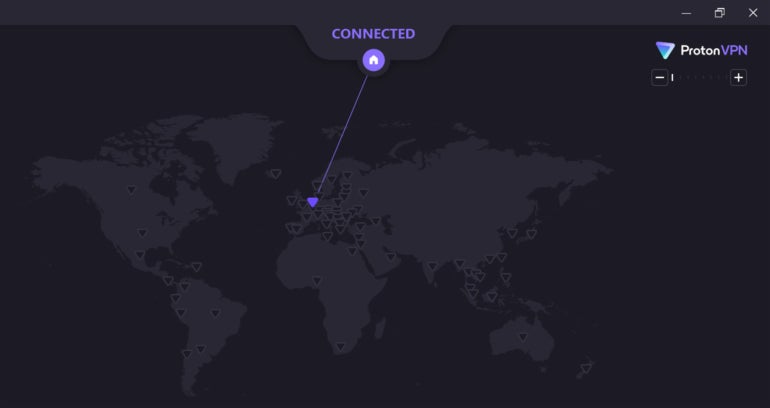
As Proton is based in Switzerland, it complies with the country’s strong privacy laws and political neutrality. All Proton users will enjoy the same legal privacy protections that Swiss citizens do.
This also means that any requests for Proton user data can’t be granted without a Swiss court order. This is a key feature for users or businesses that are concerned about government intervention. While no country is immune to breaches, Proton’s compliance with Swiss laws will grant a layer of protection you won’t find with other VPNs.
DNS leak protection
Figure C
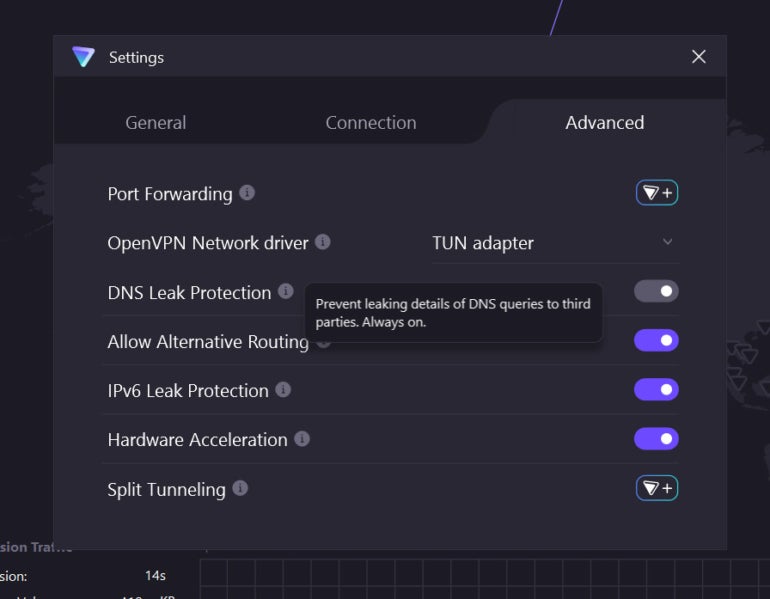
Proton VPN also promises protection against DNS leaks during dropped connections. To test this, I ran Proton VPN Free through a DNS leak test tool multiple times. Throughout testing, no leaks were detected.
Proton also activates DNS Protection out of the box. Given that DNS leak protection is a crucial VPN feature, we commend Proton for setting it to “always on” upon setup.
Kill switch
Figure D
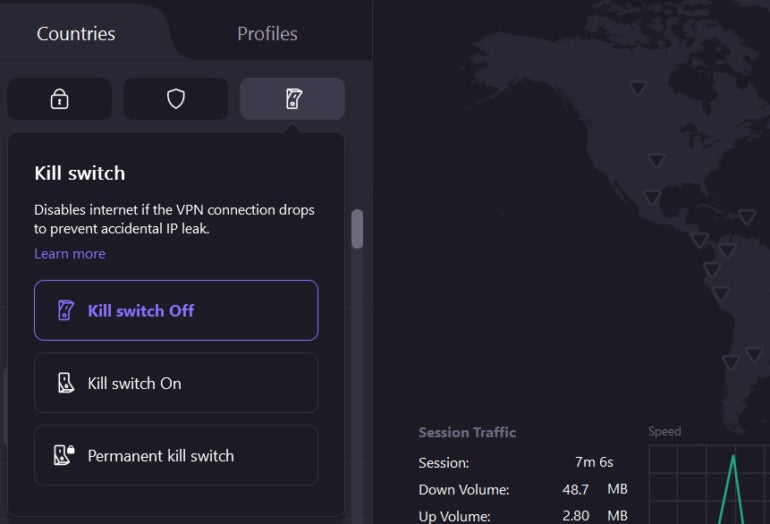
Proton also comes with a kill switch that acts as a last line of defense during an outage or disruption. In the event your VPN connection fails, the kill switch will automatically stop your machine from reconnecting to the internet without the VPN’s protection. This prevents any unwanted sharing of data from your computer to your internet service provider.
It goes further as Proton allows users to turn on a “permanent kill switch.” When activated, any connection not done via a Proton VPN server is blocked or cut out.
In my testing, the permanent kill switch worked as advertised — even with the main app closed and running in the background. This set-it-and-forget-it feature can keep your data private during unwanted disruptions.
Speed and performance: How fast is ProtonVPN?
While it’s normal to have lower upload and download speeds with a VPN, Proton still provided good and stable numbers during testing. This was true during my general use of the service, which included browsing social media, accessing Google services like Docs and Drive and watching YouTube videos. I also didn’t experience any difficulty maintaining a stable connection while testing Proton. For speed and stability, Proton VPN performed well.
ProtonVPN Servers and locations
Proton offers 3,024 servers in 69 countries to choose from at the time of publication.
Proton’s fleet of servers falls in the middle tier among its competition. While its number of servers is average, it still maintains an adequate spread across different countries.
It offers three different server types: Free, Plus and Secure Core servers. Free servers, which come with Proton’s free version, provide basic protection with medium speeds. Meanwhile, Plus servers allow streaming support, ad blocking, torrenting and a faster connection.
Lastly, Secure Core servers add to Plus servers’ functionality by introducing stronger protection against data attacks. Secure Core routes your traffic through multiple servers, making it harder for bad actors to attain your true IP address. These servers are wholly owned by Proton and are housed in privacy-friendly countries (like Switzerland or Iceland) for even more security.
In my view, Secure Core is a unique selling point of Proton VPN that many privacy-focused users will find valuable. This is especially true if you use servers located in more high-risk areas like the U.S.
ProtonVPN Pros
- Offers strong Switzerland-based privacy features.
- Implements a strict no-logs policy.
- Provides more than 3,000 servers in 69 countries.
- Open source and independently audited.
- Has a free version.
- Supports up to 10 simultaneous connections.
ProtonVPN Cons
- Priced relatively high.
- Live chat support is only available for paid users.
Who is ProtonVPN best for?
If you’re looking for a VPN that specializes against government surveillance, ProtonVPN is a great solution. Its Swiss-backed privacy is a meaningful value proposition, especially when it comes to protecting sensitive business or user data. It also gets a lot of the core features right with its strong set of protocols, kill switch and DNS leak protection, to name a few.
ProtonVPN is made for those who want an integrated ecosystem of encrypted and secure software. Proton also offers the VPN bundled with its other encrypted services through its Proton Unlimited plan.
While there are cheaper options out there, Proton’s overall package and lack of glaring drawbacks make it a good choice. Unsure buyers also have the benefit of being able to access Proton VPN for free.
ProtonVPN alternatives
While ProtonVPN is a decent VPN option, not everyone will find it a good fit. We’ve listed similar alternatives below that offer different features for each VPN user.

NordVPN
NordVPN is one of the most well-known VPNs in the market today. Nord is great for secure file-sharing, as its Meshnet feature allows users to transfer and share files through their own private encrypted network. It has around 5,710 servers in 60 countries and a threat protection feature that combats malware, ads and web trackers.

Surfshark
Another prominent VPN is Surfshark. This VPN is best for multiple devices, as it gives users an unlimited number of device connections to the service. It also has zero bandwidth limitations and offers a seven-day free trial to test it out.

CyberGhost VPN
CyberGhost VPN is another great VPN solution. It’s known for its extensive server network, offering around 9,200 servers in 91 countries. This allows users to access a broad selection of geo-restricted content while maintaining a stable connection.
Review Methodology
My review of Proton VPN involved a detailed assessment of its security features, cost and real-world performance. I had hands-on time with ProtonVPN’s free version and supplemented my findings with user testimonials and reputable reviews for both the free and paid tiers.
For speed and performance, I tested ProtonVPN Free using a Windows computer and ran it through Ookla’s Speedtest. As a disclaimer, VPN speeds will vary depending on a lot of factors: your internet service provider, your device, your location and the particular server you choose. To test for DNS leaks, I ran Proton VPN Free multiple times through DNSleaktest.
Finally, I scored Proton on everything from its pricing to its protocols based on an internal algorithm to get a final rating out of 5 stars. The scoring on the rubric was based both on Proton VPN on its own and in relation to other VPN services in the market.
